-
 Bitcoin
Bitcoin $84,258.9872
0.35% -
 Ethereum
Ethereum $1,590.5943
1.14% -
 Tether USDt
Tether USDt $0.9998
-0.02% -
 XRP
XRP $2.0990
1.26% -
 BNB
BNB $587.2456
1.30% -
 Solana
Solana $132.5296
6.11% -
 USDC
USDC $0.9999
0.00% -
 TRON
TRON $0.2483
-2.37% -
 Dogecoin
Dogecoin $0.1557
1.96% -
 Cardano
Cardano $0.6199
2.68% -
 UNUS SED LEO
UNUS SED LEO $9.1185
-2.93% -
 Chainlink
Chainlink $12.4572
2.80% -
 Avalanche
Avalanche $19.2046
1.97% -
 Toncoin
Toncoin $2.9568
3.52% -
 Stellar
Stellar $0.2397
2.14% -
 Shiba Inu
Shiba Inu $0.0...01181
1.81% -
 Sui
Sui $2.0961
0.90% -
 Hedera
Hedera $0.1602
2.15% -
 Bitcoin Cash
Bitcoin Cash $330.4313
4.06% -
 Polkadot
Polkadot $3.6278
3.32% -
 Litecoin
Litecoin $74.9638
1.65% -
 Hyperliquid
Hyperliquid $16.4916
8.27% -
 Dai
Dai $0.9999
-0.01% -
 Bitget Token
Bitget Token $4.3499
0.87% -
 Ethena USDe
Ethena USDe $0.9990
-0.03% -
 Pi
Pi $0.6068
-1.04% -
 Monero
Monero $216.4766
0.12% -
 Uniswap
Uniswap $5.1795
0.94% -
 Pepe
Pepe $0.0...07203
1.55% -
 OKB
OKB $50.4898
-2.39%
What is the transaction process in the NFT secondary market?
In the NFT secondary market, transactions involve listing, buying, and blockchain verification, ensuring secure ownership transfer and payment via cryptocurrency.
Apr 07, 2025 at 11:57 pm
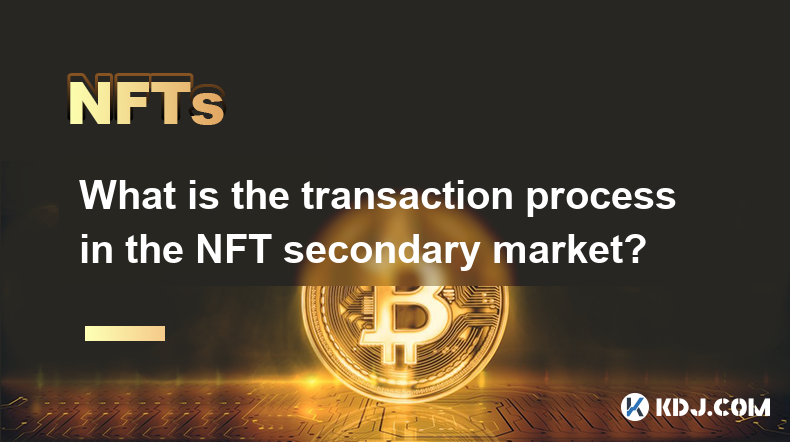
The transaction process in the NFT secondary market involves several key steps that ensure the smooth transfer of ownership and payment between buyers and sellers. This process is facilitated by blockchain technology, which provides a secure and transparent platform for these transactions. Understanding the intricacies of this process can help both buyers and sellers navigate the NFT market more effectively.
In the NFT secondary market, transactions typically begin with a seller listing their NFT for sale on a marketplace. This listing includes details such as the price, the NFT's unique attributes, and any additional information that might attract potential buyers. Once the NFT is listed, buyers can browse the marketplace, view the available NFTs, and decide which ones they wish to purchase. When a buyer decides to buy an NFT, they initiate the transaction process, which involves several steps to ensure the transfer of ownership and payment.
Listing the NFT for Sale
The first step in the transaction process is for the seller to list their NFT on a secondary market platform. This involves uploading the NFT to the platform and setting a price. The seller must also provide any relevant information about the NFT, such as its history, rarity, and any unique features that might increase its value. Once the NFT is listed, it becomes visible to potential buyers who can browse the marketplace and view the available NFTs.
Initiating the Purchase
When a buyer finds an NFT they wish to purchase, they initiate the transaction by clicking on the "Buy" button or making an offer if the NFT is listed for auction. The buyer must have a digital wallet connected to the marketplace, which contains the necessary cryptocurrency to complete the purchase. The marketplace will then prompt the buyer to confirm the transaction, which includes the price of the NFT and any associated fees.
Transaction Verification
Once the buyer confirms the transaction, the marketplace sends the transaction details to the blockchain for verification. This step involves the blockchain network validating the transaction to ensure that the buyer has the necessary funds and that the NFT is indeed owned by the seller. This verification process is crucial for maintaining the integrity of the transaction and preventing fraud.
Transfer of Ownership
After the transaction is verified, the blockchain updates the ownership records to reflect the new owner of the NFT. This transfer of ownership is recorded on the blockchain, making it immutable and transparent. The seller receives the payment in cryptocurrency, which is transferred to their digital wallet. The buyer, now the new owner of the NFT, can access and manage their new asset through the marketplace or their digital wallet.
Finalizing the Transaction
Once the ownership transfer is complete, the transaction is considered finalized. The buyer can now enjoy their new NFT, and the seller can use the cryptocurrency received to purchase other NFTs or convert it to fiat currency. The marketplace may also charge a transaction fee, which is typically a percentage of the sale price, to cover the costs of facilitating the transaction.
Additional Considerations
There are several additional considerations that buyers and sellers should keep in mind when participating in the NFT secondary market. These include understanding the fees associated with transactions, the volatility of cryptocurrency prices, and the importance of due diligence when researching NFTs. Buyers should also be aware of the potential for scams and take steps to protect themselves, such as using reputable marketplaces and verifying the authenticity of the NFTs they are purchasing.
The Role of Smart Contracts
Smart contracts play a crucial role in the transaction process of the NFT secondary market. These self-executing contracts are programmed to automatically enforce the terms of the transaction, ensuring that the transfer of ownership and payment occurs as intended. Smart contracts help to streamline the transaction process, reduce the risk of fraud, and provide a high level of transparency and security for both buyers and sellers.
Marketplaces and Platforms
The choice of marketplace or platform can significantly impact the transaction process in the NFT secondary market. Different platforms may have varying fee structures, user interfaces, and levels of security. Some popular NFT marketplaces include OpenSea, Rarible, and Foundation, each offering unique features and benefits to users. Buyers and sellers should research and compare different platforms to find the one that best suits their needs and preferences.
Cryptocurrency and Payment
Cryptocurrency is the primary method of payment in the NFT secondary market. Buyers must have a digital wallet that supports the cryptocurrency used by the marketplace, such as Ethereum (ETH) or other compatible tokens. The volatility of cryptocurrency prices can impact the value of NFTs, so buyers and sellers should be aware of market fluctuations and consider the timing of their transactions. Additionally, some platforms may support multiple cryptocurrencies, providing more flexibility for users.
Security and Fraud Prevention
Security is a critical aspect of the transaction process in the NFT secondary market. Both buyers and sellers should take steps to protect themselves from potential scams and fraud. This includes using reputable marketplaces, verifying the authenticity of NFTs, and securing their digital wallets with strong passwords and two-factor authentication. Blockchain technology provides a high level of security, but users must still be vigilant and take responsibility for their own safety.
Legal and Regulatory Considerations
The NFT secondary market is subject to various legal and regulatory considerations that can impact the transaction process. These may include tax implications, intellectual property rights, and compliance with anti-money laundering (AML) and know-your-customer (KYC) regulations. Buyers and sellers should be aware of the legal framework in their jurisdiction and ensure that they are in compliance with all relevant laws and regulations.
The Future of NFT Transactions
The transaction process in the NFT secondary market is continually evolving as technology advances and the market matures. Innovations such as layer-2 scaling solutions, improved user interfaces, and enhanced security measures are likely to streamline the transaction process and make it more accessible to a broader audience. As the NFT market continues to grow, the transaction process will play a crucial role in facilitating the exchange of digital assets and driving the adoption of blockchain technology.
Common Questions Related to the Transaction Process in the NFT Secondary Market
Q: What is the first step in the transaction process for selling an NFT in the secondary market?
A: The first step is for the seller to list their NFT on a secondary market platform. This involves uploading the NFT, setting a price, and providing relevant information about the NFT to attract potential buyers.
Q: How does the buyer initiate a purchase in the NFT secondary market?
A: The buyer initiates a purchase by clicking on the "Buy" button or making an offer if the NFT is listed for auction. They must have a digital wallet connected to the marketplace with the necessary cryptocurrency to complete the transaction.
Q: What role does the blockchain play in the transaction process?
A: The blockchain plays a crucial role in verifying the transaction, updating ownership records, and ensuring the security and transparency of the transaction process. It validates the transaction to ensure that the buyer has the necessary funds and that the NFT is owned by the seller.
Q: How are smart contracts used in NFT transactions?
A: Smart contracts are self-executing contracts that automatically enforce the terms of the transaction. They ensure that the transfer of ownership and payment occurs as intended, streamlining the process and reducing the risk of fraud.
Q: What should buyers and sellers consider when choosing an NFT marketplace?
A: Buyers and sellers should consider factors such as fee structures, user interfaces, security measures, and the reputation of the marketplace. Different platforms offer unique features and benefits, so it's important to research and compare them to find the best fit.
Q: What are the primary methods of payment in the NFT secondary market?
A: The primary method of payment in the NFT secondary market is cryptocurrency, such as Ethereum (ETH) or other compatible tokens. Buyers must have a digital wallet that supports the cryptocurrency used by the marketplace.
Q: How can buyers and sellers protect themselves from fraud in the NFT secondary market?
A: To protect themselves from fraud, buyers and sellers should use reputable marketplaces, verify the authenticity of NFTs, and secure their digital wallets with strong passwords and two-factor authentication. Being vigilant and taking responsibility for their own safety is crucial.
Q: What legal and regulatory considerations should be taken into account in the NFT secondary market?
A: Legal and regulatory considerations include tax implications, intellectual property rights, and compliance with anti-money laundering (AML) and know-your-customer (KYC) regulations. Buyers and sellers should be aware of the legal framework in their jurisdiction and ensure compliance with all relevant laws and regulations.
Q: How might the transaction process in the NFT secondary market evolve in the future?
A: The transaction process may evolve with innovations such as layer-2 scaling solutions, improved user interfaces, and enhanced security measures. These advancements could streamline the process and make it more accessible to a broader audience, driving the adoption of blockchain technology.
Disclaimer:info@kdj.com
The information provided is not trading advice. kdj.com does not assume any responsibility for any investments made based on the information provided in this article. Cryptocurrencies are highly volatile and it is highly recommended that you invest with caution after thorough research!
If you believe that the content used on this website infringes your copyright, please contact us immediately (info@kdj.com) and we will delete it promptly.
- Kaspa (KAS) Price Prediction Hints at Accumulation Before Potential Surge
- 2025-04-17 22:15:13
- FET Price Prediction: Artificial Superintelligence Alliance (FET) Cryptocurrency Rebounds 10%
- 2025-04-17 22:15:13
- U.S. President Donald Trump Slammed Fed Chair Jerome Powell
- 2025-04-17 22:15:12
- Running a laundromat can't be as "easy" as potential investors may believe it is
- 2025-04-17 22:15:12
- BlockDAG (BDAG) Presale Explosion and Mobile Mining Powerhouse
- 2025-04-17 22:05:12
- Solana (SOL) Price Prediction: Eyes on $180 as Structure Turns Bullish
- 2025-04-17 22:05:12
Related knowledge
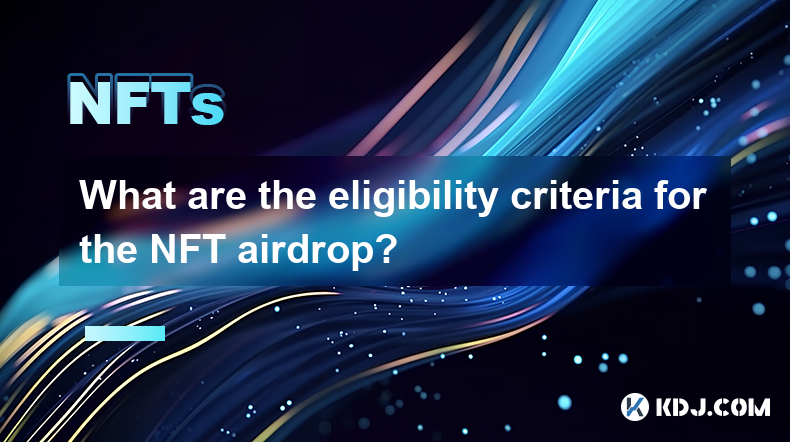
What are the eligibility criteria for the NFT airdrop?
Apr 17,2025 at 04:56pm
Understanding NFT AirdropsNFT airdrops are a popular method used by blockchain projects to distribute non-fungible tokens (NFTs) to their community members. These airdrops can serve various purposes, such as rewarding loyal users, promoting new projects, or increasing the visibility of existing ones. To participate in an NFT airdrop, individuals must me...

How to combine traditional artworks with NFTs?
Apr 17,2025 at 12:35am
The integration of traditional artworks with Non-Fungible Tokens (NFTs) represents a fascinating intersection of art and technology, offering artists and collectors new ways to engage with and monetize art. This article will explore how traditional artworks can be combined with NFTs, providing a detailed guide on the process, benefits, and consideration...
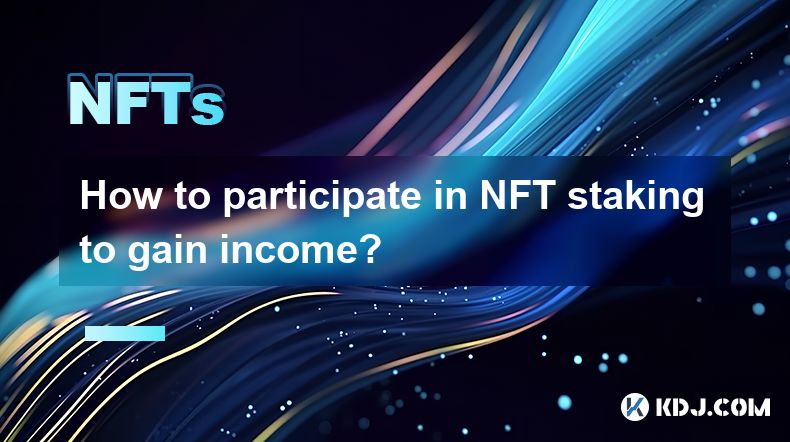
How to participate in NFT staking to gain income?
Apr 17,2025 at 06:14pm
Participating in NFT staking to generate income has become an increasingly popular method within the cryptocurrency community. NFT staking involves locking up your Non-Fungible Tokens in a smart contract to earn rewards, typically in the form of additional tokens or other benefits. This guide will walk you through the process of participating in NFT sta...
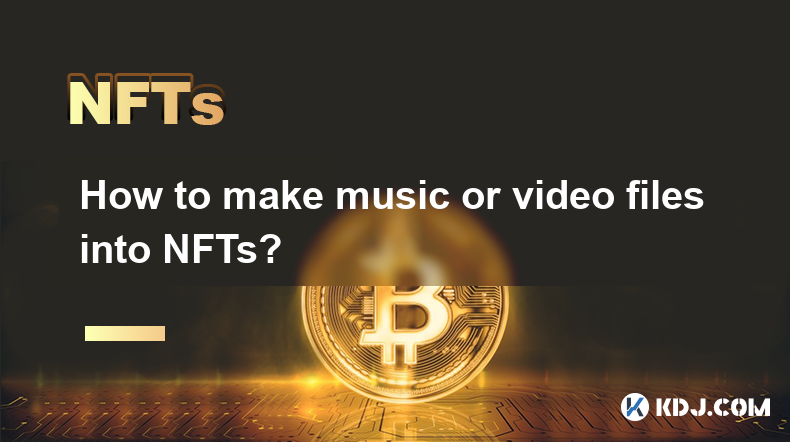
How to make music or video files into NFTs?
Apr 16,2025 at 10:29pm
Creating music or video files into Non-Fungible Tokens (NFTs) has become an increasingly popular way for artists and creators to monetize their work directly. This process involves converting your digital content into a unique token on a blockchain, which can then be bought, sold, or traded. Here’s a detailed guide on how to transform your music or vide...
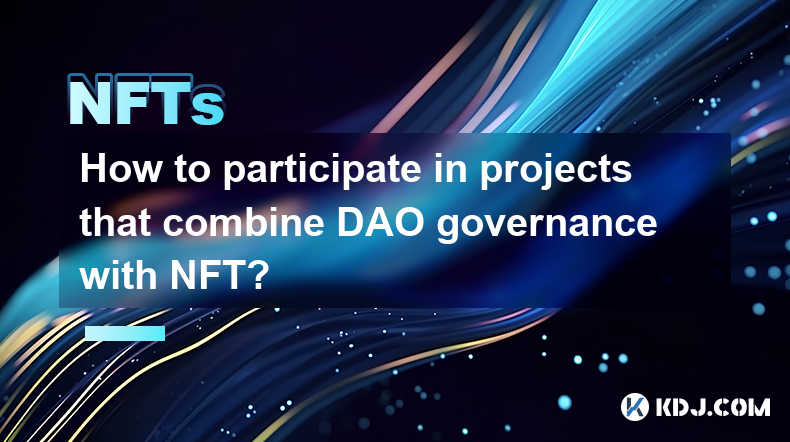
How to participate in projects that combine DAO governance with NFT?
Apr 17,2025 at 10:14am
Participating in projects that combine DAO governance with NFTs offers a unique opportunity to engage with decentralized communities and digital assets. These projects often involve voting on project decisions and owning unique digital tokens that can represent membership, access, or other benefits. Here's a detailed guide on how to participate in such ...
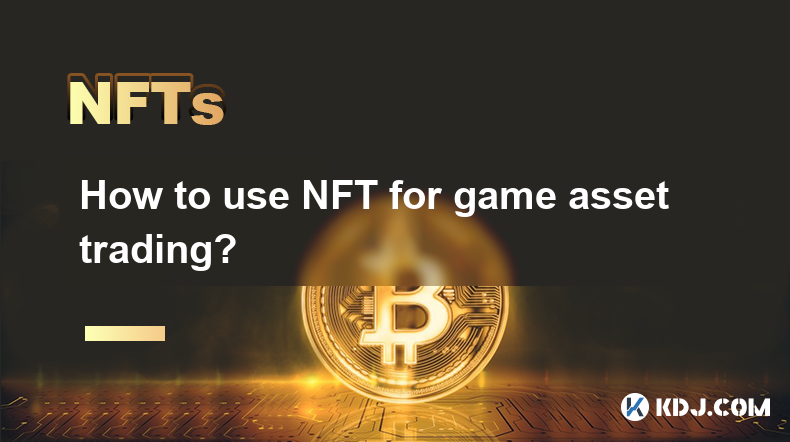
How to use NFT for game asset trading?
Apr 17,2025 at 12:21pm
Using Non-Fungible Tokens (NFTs) for game asset trading has become an increasingly popular method for gamers and developers alike to buy, sell, and trade unique in-game items. NFTs provide a way to prove ownership and authenticity of digital assets, making them perfect for trading game items that have unique characteristics and value. In this article, w...

What are the eligibility criteria for the NFT airdrop?
Apr 17,2025 at 04:56pm
Understanding NFT AirdropsNFT airdrops are a popular method used by blockchain projects to distribute non-fungible tokens (NFTs) to their community members. These airdrops can serve various purposes, such as rewarding loyal users, promoting new projects, or increasing the visibility of existing ones. To participate in an NFT airdrop, individuals must me...

How to combine traditional artworks with NFTs?
Apr 17,2025 at 12:35am
The integration of traditional artworks with Non-Fungible Tokens (NFTs) represents a fascinating intersection of art and technology, offering artists and collectors new ways to engage with and monetize art. This article will explore how traditional artworks can be combined with NFTs, providing a detailed guide on the process, benefits, and consideration...

How to participate in NFT staking to gain income?
Apr 17,2025 at 06:14pm
Participating in NFT staking to generate income has become an increasingly popular method within the cryptocurrency community. NFT staking involves locking up your Non-Fungible Tokens in a smart contract to earn rewards, typically in the form of additional tokens or other benefits. This guide will walk you through the process of participating in NFT sta...

How to make music or video files into NFTs?
Apr 16,2025 at 10:29pm
Creating music or video files into Non-Fungible Tokens (NFTs) has become an increasingly popular way for artists and creators to monetize their work directly. This process involves converting your digital content into a unique token on a blockchain, which can then be bought, sold, or traded. Here’s a detailed guide on how to transform your music or vide...

How to participate in projects that combine DAO governance with NFT?
Apr 17,2025 at 10:14am
Participating in projects that combine DAO governance with NFTs offers a unique opportunity to engage with decentralized communities and digital assets. These projects often involve voting on project decisions and owning unique digital tokens that can represent membership, access, or other benefits. Here's a detailed guide on how to participate in such ...

How to use NFT for game asset trading?
Apr 17,2025 at 12:21pm
Using Non-Fungible Tokens (NFTs) for game asset trading has become an increasingly popular method for gamers and developers alike to buy, sell, and trade unique in-game items. NFTs provide a way to prove ownership and authenticity of digital assets, making them perfect for trading game items that have unique characteristics and value. In this article, w...
See all articles























































































